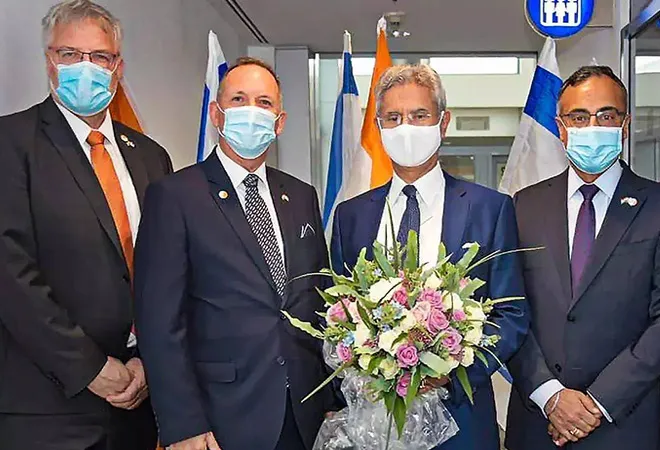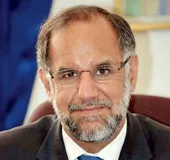
The October 13 meeting in Washington DC between Secretary of State, Antony Blinken, UAE Foreign Minister, Sheikh Abdullah bin Zayed Al Nahyan and Israel’s alternate Prime Minister and Foreign Minister Yair Lapid was a reminder of the extent of transformation in West Asia since the announcement of the Abraham Accords on 14 August 2020. A press statement issued by the State Department said that Blinken ‘welcomed the warming relations between Israel and the UAE, including the opening of respective embassies, appointment of ambassadors, new direct flights, dozens of cultural exchanges, and burgeoning economic and business ties that have benefited the people of both countries and the region.’
The trilateral meeting reflected the eagerness with which the Biden administration has embraced the Jared Kushner-led Abraham Accords negotiated during the final months of the Trump presidency, albeit with the caveat that ‘the Secretary also reiterated the administration’s commitment to advancing a negotiated two-state solution and to harnessing these agreements to that end.’ In contrast to the cavalier disregard for Palestinian rights displayed by the Trump administration in the ‘deal of the century’ that was unveiled in the White House in January 2020, the Biden administration continues to at least pay lip service to the principal of a two-state solution. US officials, in fact, have reiterated that the Abraham Accords are not a substitute for a negotiated settlement between Israel and Palestine.
The Palestine issue also came up in Sheikh Abdullah’s comments to the press following the trilateral meeting. Acknowledging that he has accepted an invitation from Yair Lapid and plans to visit Israel soon, Sheikh Abdullah emphasised that a more successful UAE-Israeli relationship would encourage both Israelis and Palestinians to see ‘that this path works, that this path is worth not only investing in but also taking the risk.’
The trilateral meeting also announced the establishment of two separate working groups, one on religious coexistence and the other on water and energy. Over the last few years, UAE has taken the lead in trying to combat religious extremism through an ambitious programme of promoting religious tolerance. High-profile inter-faith conferences, bringing the Pope and the Grand Sheikh of Al Azhar to Abu Dhabi to sign an expansive Document of Human Fraternity and the work underway to build the sprawling ‘House of Abrahamic Family’ that will host a mosque, a church, and a synagogue within the same complex on Abu Dhabi’s Saadiyat island are some of the more striking examples. The trilateral working group on religious coexistence announced in Washington DC will ‘seek to advance interfaith and intercultural dialogue and combat religious intolerance and hate, including through collaboration between religious and spiritual leaders, scholars, and their respective governments.’ The imprint of the UAE leadership on this working group is evident, although a question mark must remain around the zeal with which Prime Minister Naftali Bennet’s right-wing government participates in the initiative.
Reports suggest that the US used the trilateral talks to highlight its concerns over China’s growing presence in both Israel and UAE. The new US $1.7 billion container terminal built in Haifa by state-owned Shanghai International Port Group will clearly boost Israel’s logistics capacity. But it also sits close to a port used by US and Israeli naval vessels and raises fears of Chinese surveillance on their movements. The fact that Ashdod, Israel’s only other major port on the Mediterranean is also being upgraded by the China Harbour Engineering Company has only added to worries that state-owned Chinese companies are muscling into sensitive infrastructure projects in a strategic ally.
Abu Dhabi, meanwhile, has signed a 35-year concession agreement with China Ocean Shipping Company (Cosco) to develop a new container terminal in Khalifa Port that is situated halfway between Abu Dhabi and Dubai and has ambitions to be a mega-hub in the China’s Belt and Road Initiative (BRI) project. UAE’s early decision to go with Huawei for its 5G telecom networks also became a bone of contention, with some reports indicating that the US may go slow on the agreement to supply F-35 fighter jets if its security concerns over 5G networks are not addressed. It may not be coincidental that in recent months, both Etisalat and du—UAE’s telecom duopoly—have signed agreements to obtain sections of their 5G hardware from Ericsson and Nokia.
Iran, of course, remains a central issue for each of the three countries. US Secretary of State Blinken said after the trilateral talks that ‘time is running short’ on an Iranian return to full compliance with the 2015 nuclear deal but emphasised that the US believes ‘the diplomatic path is the most effective way’ to make sure that Tehran doesn’t acquire nuclear weapons.
Iran, of course, remains a central issue for each of the three countries. US Secretary of State Blinken said after the trilateral talks that ‘time is running short’ on an Iranian return to full compliance with the 2015 nuclear deal but emphasised that the US believes ‘the diplomatic path is the most effective way’ to make sure that Tehran doesn’t acquire nuclear weapons. The Emiratis have been vocal critics of the Obama era agreement with Iran and argued that as a key regional player, they should also have a place on the negotiating table. In recent months, they have made guarded overtures to Tehran to lower the temperatures but remain concerned that the JCPOA made no attempt to address Iran’s meddling in regional affairs including Yemen, Bahrain, Iraq, Syria, and Lebanon. Israel continues to maintain a hard-line and Lapid again indicated that other options are available if the negotiations were to fail.
Notable progress
But none of this should take the spotlight away from the real progress made by UAE and Israel in developing their bilateral ties during the course of the last 14 months. Foreign Minister Sheikh Abdullah’s trusted and very capable Chief of Staff, Mohammed Al Khaja assumed charge in March 2021 as UAE’s first ambassador to Israel and the UAE embassy in Tel Aviv was formally inaugurated in July. Israel, meanwhile, has opened its embassy in Abu Dhabi and a consulate in Dubai in June. Some of the other developments that are worth mentioning include:
- A bilateral investment promotion agreement finalised in October 2020
- A Double Taxation Avoidance agreement signed in May 2021
- An MoU between Dubai’s DP World and Israel’s Bank Leumi to invest in Israel’s ports sector
- An agreement between Emirates NBD and Bank Hapoalim to start banking services between UAE and Israel
- A strategic agreement between Jebel Ali Free Zone and Federation of Israeli Chambers of Commerce to support Israeli companies establishing businesses in Dubai
- Agreement between Etihad Credit Insurance and Israeli Foreign Trade Risks Insurance Corporation
- MoU between Abu Dhabi Securities Exchange and Tel Aviv Stock Exchange to develop capital markets
- MoU between Israel’s Money Laundering and Terror Financing Prohibition Authority and UAE’s Financial Intelligence Unit to prevent money laundering
- Agreement between DIFC FinTech Hive and FinTech Tel Aviv to strengthen the role of Dubai International Financial Centre as a global fintech hub
- MoU between UAE’s EDGE and Israel Aerospace Industries to develop advanced Counter-Unmanned Aircraft System
- Joint venture between UAE’s G42 and Rafael Advanced Defence Systems to commercialise AI and big data technologies
- Agreement between Etihad Engineering and Israel Aerospace Industries to establish a facility in Abu Dhabi for converting Boeing passenger planes into cargo aircraft.
This is only a small sample of the architecture that has already been put in place to create a broad-based relationship. It does not cover the numerous other agreements and MoUs related to renewable energy, water conservation, healthcare, civil aviation, and people-to-people links. The contrast between the ‘normal’ and vibrant relationship emerging between UAE and Israel with the relatively cold, security-dominated ties between Egypt and Israel even after four decades since the historic Camp David Accords couldn’t be more stark.
The contrast between the ‘normal’ and vibrant relationship emerging between UAE and Israel with the relatively cold, security-dominated ties between Egypt and Israel even after four decades since the historic Camp David Accords couldn’t be more stark.
Given the fact that India has close ties with each of the three members of this trilateral, the upcoming first meeting of the foreign ministers of India, Israel, US, and UAE may be the harbinger of another Quad in the making.
The views expressed above belong to the author(s). ORF research and analyses now available on Telegram! Click here to access our curated content — blogs, longforms and interviews.




 PREV
PREV


